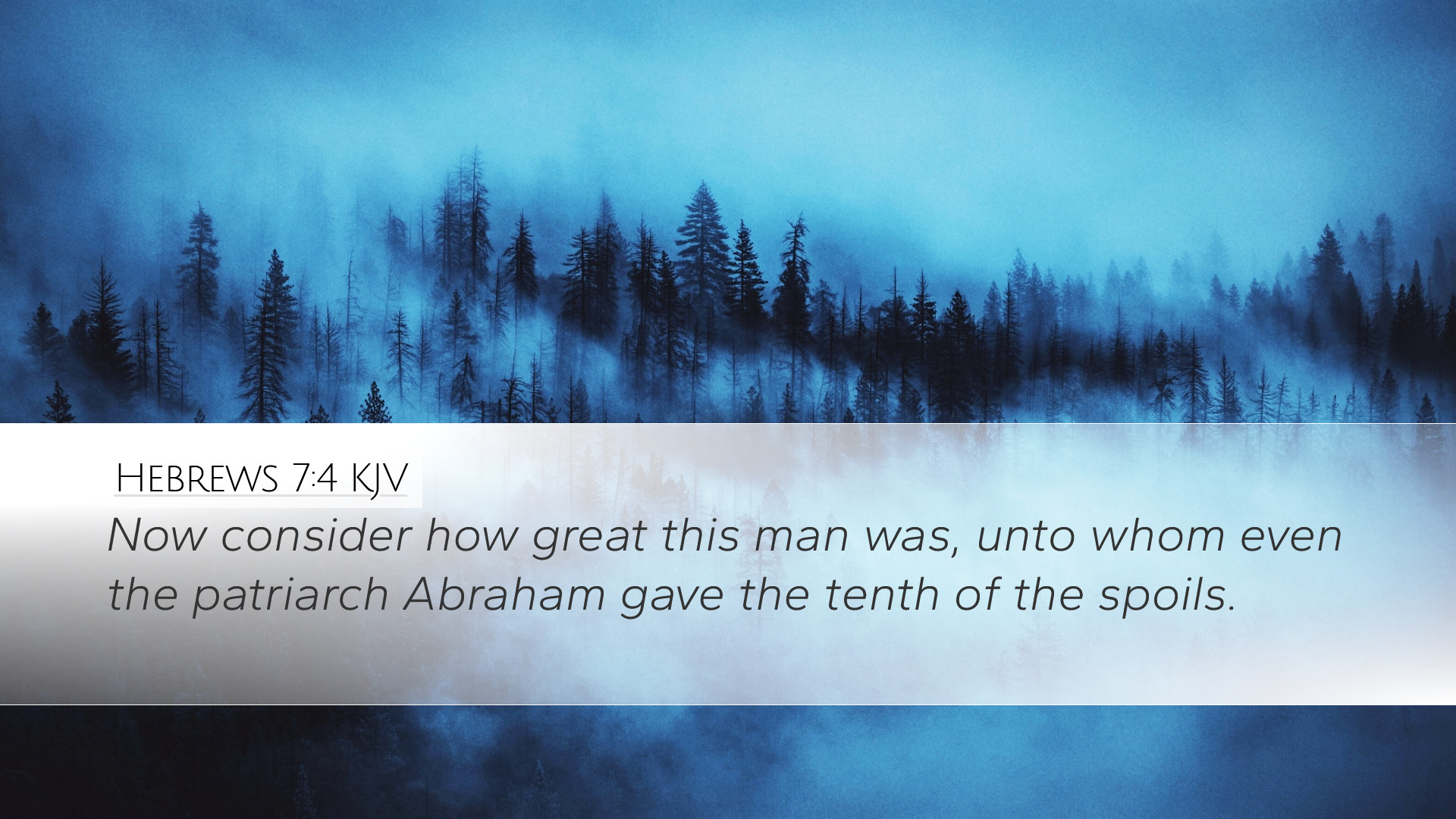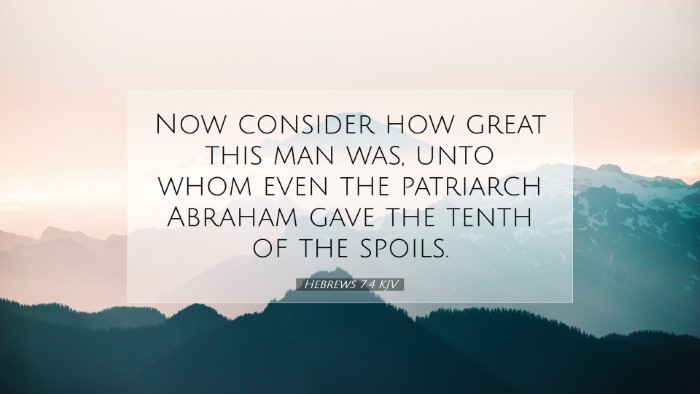Commentary on Hebrews 7:4
Verse: "Now consider how great this man was, to whom even the patriarch Abraham gave a tenth of the spoils." (Hebrews 7:4)
Introduction
This verse is pivotal in understanding the greatness of Melchizedek, a figure whose brief appearance in the Scriptures raises profound theological implications. In this commentary, we synthesize insights from renowned public domain commentaries, particularly those of Matthew Henry, Albert Barnes, and Adam Clarke, to illuminate the depth of this verse for pastors, students, theologians, and scholars.
Contextual Examination
Before delving into the examination of the individual elements of Hebrews 7:4, it is critical to understand its context within the chapter. The author of Hebrews is addressing Jewish Christians, emphasizing the superiority of Christ’s priesthood over the Levitical priesthood. The mention of Melchizedek serves to demonstrate the unique nature of Christ’s mediatorial role, one that transcends traditional boundaries.
Melchizedek's Superiority
Hebrews 7:4 draws attention to the encounter between Abraham and Melchizedek, highlighting the significance of Abraham’s actions. Melchizedek, described as king of Salem and priest of the Most High God, receives a tithe from Abraham, a gesture that establishes his authority and superiority.
Matthew Henry's Insights
Henry emphasizes the importance of recognizing Melchizedek's unique status. He notes that "this man was great," suggesting that his greatness is evidenced by Abraham's acknowledgment. Abraham, revered as the father of faith and patriarch to the Israelites, willingly gives a tithe, underscoring Melchizedek’s superior priestly and kingly role.
Albert Barnes' Observations
Barnes further elaborates on the implications of this event in terms of priesthood. He indicates that the fact Abraham pays a tithe signifies that Melchizedek held a higher spiritual authority. "The patriarch himself thus owned him as superior." This elevates Melchizedek as a type of Christ, who is our eternal High Priest, surpassing the Aaronic line.
Adam Clarke's Analysis
Clarke presents additional dimensions to the historical interpretation of Melchizedek. He argues that the act of giving a tithe is not merely a transaction but a declaration of Melchizedek's divine right to priesthood. For Clarke, this act “establishes him as a priest superior to the Levitical priests,” reinforcing the argument for Christ’s priestly lineage through Melchizedek, rather than Aaron.
Theological Implications
The assertion, "consider how great this man was," is an invitation to meditate on the implications of Melchizedek's priesthood. Both Henry and Barnes underscore that understanding Melchizedek's role is essential for grasping the nature of Christ’s eternal priesthood. This theological framework lays the groundwork for the author of Hebrews to construct a compelling argument emphasizing Jesus' superiority over the old covenant sacrificial system.
Implications for Ministry
For pastors and theological students, Hebrews 7:4 serves as a reminder of the importance of recognizing divine authority. Understanding Melchizedek's priesthood leads to a deeper appreciation of Jesus as the ultimate High Priest. This realization calls Christian leaders to lead with humility and reverence, acknowledging that their authority is derived from the greater divine calling rather than self-assertion.
Application for Personal Spiritual Growth
For individual believers, this verse underlines the importance of submission to spiritual authority and the act of giving as a response to God’s greatness. Both Clarke and Henry suggest that recognizing the holiness and authority of God should compel believers to offer their lives—symbolized in the giving of tithes—as an act of worship, much like Abraham did.
Conclusion
Hebrews 7:4 invites readers to delve deeper into the richness of biblical theology regarding Christ’s priesthood, with Melchizedek serving as an archetype of this divine order. By synthesizing perspectives from esteemed commentaries, we appreciate the significance of Melchizedek’s role as one that foreshadows Christ and establishes a foundation for understanding the believer’s relationship with God through Jesus. As we contemplate Melchizedek’s greatness, we also recognize the call to live in accordance with the divine authority bestowed upon believers through Christ’s intercession.
Key Takeaways
- The greatness of Melchizedek foreshadows the superiority of Christ’s priesthood.
- Abraham’s tithe signifies acknowledgment of divine authority, elevating Melchizedek’s status.
- Understanding Melchizedek deepens our appreciation for Christ’s eternal role as High Priest.
- The verse invites believers to consider their own responses to God’s authority and greatness.
- Insights from historical commentaries provide a profound understanding necessary for teaching and personal growth.


